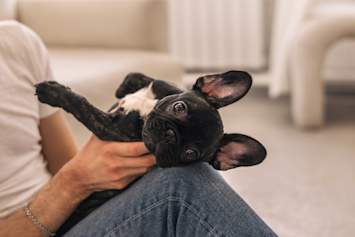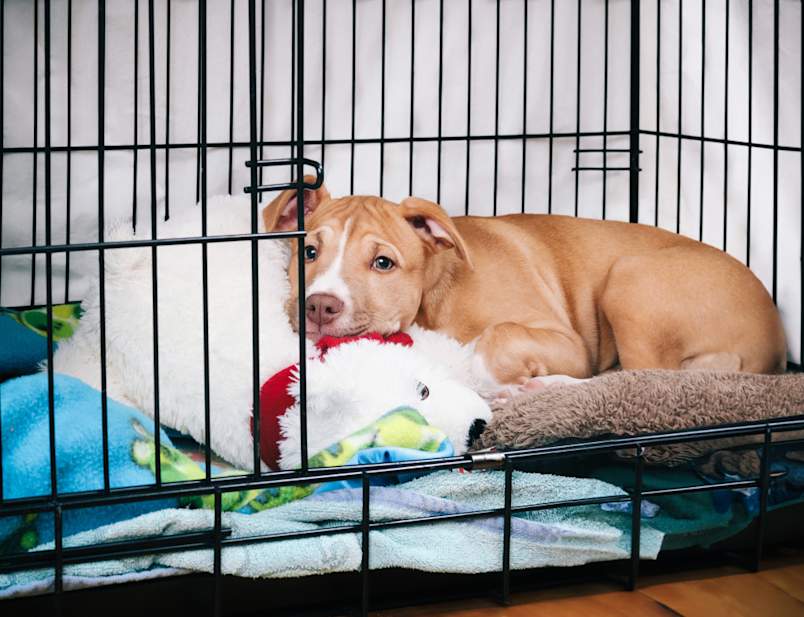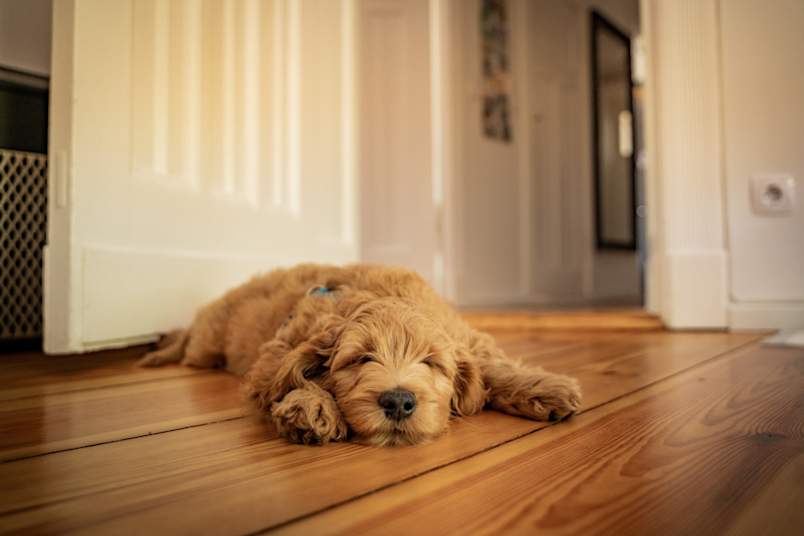
You’re Getting a New Puppy! Yay! What Now??
Having a new puppy is exciting; however, it can be a little scary too. You want to provide the best possible home for your newest family member, but it can seem impossible to know what to expect, especially what to expect in the first day of having a new puppy. What will they eat? What is normal behavior? What do you need for your puppy?
While it may feel like you have a lot of decisions and potential problems to worry about, making sure that you are prepared before the puppy comes home can be very helpful. Read on for tips on how best to prepare for your pup’s arrival and what to expect during the first 48 hours with a new puppy.
Things to Gather Before Your First Day with a Puppy
Before bringing your puppy home, go ahead and stock up on the puppy essentials that they may need. It is much easier to have these on hand before you get your puppy. This way, you can spend more time with your sweet pup. Possible items to get ahead of your puppy’s arrival include:
Dog carrier: Having a way to carry your pup safely in the car or to check-ups at the veterinarian’s office is important.
Bedding: Soft, comfortable blankets or dog beds are a great way to help a puppy feel secure. Make sure it isn’t something they can easily chew up or shred.
Crate: If you plan to crate-train your puppy, go ahead and have it ready before the puppy comes home.
Poop bags: Having a way to dispose of potty messes on walks or even in the house is super helpful.
Puppy pads: Puppy pads are absorbable, disposable mats that can be useful to help contain potty accidents or food messes during dinnertime.
Leash/expandable collar: While leash-walking takes practice, it isn’t a bad idea to have a way to keep your puppy by your side when you can’t hold them. When choosing a collar, make sure it can easily expand as your puppy grows.
Dog food: Talk with the kennel, shelter, or breeder ahead of time to determine what type of food your puppy is eating. Abruptly switching foods can cause a tummy ache, so try to keep your puppy on the same diet initially.
Food/water bowls: Purchase food and water bowls ahead of time so that they can be clean and ready for your pup upon arriving home.
Pet gates: It can be much easier to house-train a puppy if you can keep them in specific areas. Keeping a pup contained in one area of the house can also be less overwhelming for them when getting used to a new home.
Puppy-safe toys and treats: Find out what treats your puppy has been eating and purchase some for your home. If you don’t know, ask your veterinarian for recommendations on toys and treats that are safe for a puppy. Most pet stores sell small, puppy-safe treats. For toys, don’t get anything that can be accidentally swallowed or easily shredded and eaten.
Pet insurance: Medical costs for pets can add up quickly. Puppy insurance is a great way to be able to budget for those expenses and make sure you’re never in the position of trying to decide if you can afford some life-saving treatment for your new little buddy. Make sure your policy includes pet dental insurance, and consider an optional, additional pet wellness plan that can reimburse you for day-to-day puppy expenses like vaccinations, microchipping and even grooming!
Other items: For young puppies used to living with their litter, a warm water bottle (not too hot!) and nearby ticking clock can help simulate the mother’s and sibling’s warmth and heartbeat, which may put them at ease during rest time.
Prepping Your Household for the New Puppy
Puppy-proofing the home is very important before your puppy arrives. Use pet gates to keep your puppy out of dangerous areas of the home. Purchase garbage cans with a lockable lid or keep your garbage cans in areas the puppy can’t get to (e.g. under the sink, in the pantry). Block electrical outlets and cover electrical cords so your puppy can’t chew on them. Make sure breakable items or things the puppy can chew or choke on are in areas that are out of reach.
Prepare the people and pets in the home for the new puppy. Discuss how important it is to be gentle, calm, and kind during interactions and handling. Discuss everybody’s role in caring for the puppy. Who will feed them? Who will help with potty training? Teach small children how to treat animals and the importance of giving them space.
If you already have pets, it can be helpful to borrow a toy, stuffie, or bedding that the new puppy currently uses and let your pets get used to the puppy’s smell before they actually meet the puppy. Any dogs in the household that are not up to date on vaccines should get a check-up at the veterinarian’s office and have their vaccines boostered before the puppy comes home.
What to Bring with You to Pick up Your New Pup
When you are ready to pick up the new puppy, it can be helpful to bring some items with you to meet them and for the car ride home. Possible options include:
Carrier with soft towels: The car ride home can be scary, especially if your puppy is small and might have trouble keeping still in the car. A carrier with soft, fluffy towels, blankets, or bedding can help keep them comfortable during the ride.
Water and food for long trips: If you need to travel a long way to pick up the puppy, bring water and food, as well as containers to eat/drink out of. Offer food and water during driving breaks to avoid your puppy making a mess during travel.
Leash/collar: While it may not be necessary on short trips, having a collar and leash handy are helpful if you need to stop on the way home.
Stuffie/toy with your scent on it: Snuggle with a soft toy or blanket then give it to the new puppy for the ride home. This can help them get used to your scent while you drive and help keep the puppy relaxed.
Treats: The occasional treat during the drive can help prevent your pet from becoming bored or anxious on the ride home.
Poop bags: You never know when nature will call. Keep disposable bags in the car for accidents or bathroom breaks.

Your First 48 Hours at Home with a New Puppy
Introducing Your Puppy to the House
A new home can be overwhelming for puppies. Keep them confined to one area of the home at first so they can get used to it. Avoid letting them roam free throughout the house, as this could lead to potty accidents or chewing on things they shouldn’t. Over time, you can give your puppy more and more freedom, but make sure you continue to supervise them until they are fully potty-trained and comfortable in the new environment.
Introducing the Puppy to Other Family Members (Furry and Otherwise)
Try to limit how many people your puppy meets at once so that they don’t get overwhelmed. Have each new person meet the puppy in a calm, quiet manner. The same goes for introducing the puppy to new pets in the house. Have the puppy meet everyone slowly, calmly, and one animal at a time. Make sure treats and gentle praise are involved with all animals, and don’t force any interactions if the puppy or other household members seem scared.
Potty Training
Have a designated area for your puppy to use the bathroom. Every time you take them out to potty, use a designated ‘potty word’ so your puppy eventually learns that it is time to try and go to the bathroom. Most people say “bathroom” or “potty”, but feel free to mix it up and use any word you want, just be consistent. Make sure to take frequent trips outside because your puppy will need practice figuring out where it is okay to potty. Every single time your puppy uses the bathroom in the right place, reward them with praise or treats. Important times to go outside for a bathroom break are 20-30 minutes after a meal, any time you see them sniffing around like they are looking for something (hint: it's probably a good spot to pee), after naps, right before bedtime, and immediately after leaving the crate in the morning.
Eating and Drinking- How Much and How Often to Feed Your New Puppy
It can be confusing trying to decide how much to feed your puppy, but often, a pup will dictate their own needs. Feeding 2-3 times a day is common. Base how much they need per day on the puppy’s weight, age, and the calories in the puppy food. Most commercial puppy foods will have a helpful chart on the bag to help you determine how much they should be eating.
These charts are usually guidelines- if what you are feeding seems appropriate, but your puppy is gobbling up everything you give them, the pup might be going through a growth spurt and may need a little more. You can also ask your veterinarian at the puppy’s vaccination appointments- they will be able to assess your puppy’s current body condition to give you a more accurate estimate of how much to feed.
When it comes to water, unlimited fresh water throughout the day is best. Remember to take the puppy out to potty within 20-30 minutes of drinking. Most veterinarians agree that free access to water at night is also a good idea, especially for puppies 4 months of age or younger. If your puppy plays in their water bowl or knocks it over frequently, you can offer water at regular intervals instead.
Exercise, Playing, and Sleep
Puppies can be very active, but they also get tuckered out quickly. It is common for them to nap several times a day. Frequent, short periods of exercise (e.g. walks, throwing the ball, chase) are a great way to connect with your puppy and keep them healthy. Remember to go at their pace, praise them for good behavior and bravery, and keep things light and fun. Leash training can take a while for puppies to learn, but short, exploratory walks around the backyard are a great way to start.
Training, Socialization, and the Importance of Routines
The best way to train a puppy is through routines and positive reinforcement. Try to stick to some kind of schedule and use important key words (e.g. “bathroom,” “outside,” “dinner”) so they learn what to expect. Reward your puppy every time they do something right. Do not hit or yell at your puppy when they do something wrong- it doesn’t teach them the correct behavior, and it can lead to anxious or destructive behaviors in the future. Socializing puppies by gently and gradually introducing them to other humans, animals, and new things is also very important. It helps them learn that meeting new people/animals and discovering new things can be positive experiences and it helps create a confident, well-adjusted dog.

What to Expect at Bedtime
The first few nights with a new puppy can be especially tough. You have spent all day with them, and now they have to figure out how to sleep without regular snuggles and kisses. It is completely normal for the first few nights to be tough on you and the puppy, especially until you all have the puppy sleep schedule down. Your puppy will likely have trouble settling down and sleeping in a new place. They will also probably need to use the bathroom several times in the night but won’t have learned how to let you know. Some tips for surviving those first few nights include:
Play before resting: Play with your puppy about an hour before bedtime so they will be ready to rest. Don’t overdo it- let your puppy tell you when they are tired.
Quiet-down routine: Try to establish a bed-time routine after that last play episode. Encourage calm, quiet behavior. Dim the lights and minimize household noises.
Bedtime potty break: Take your puppy outside to use the bathroom right before bedtime. Set an alarm to get up a couple times in the night to take them out again.
Where to sleep: Whether you are crate-training or letting them sleep in a dog bed, consider keeping their sleeping area near you so they won’t be anxious. Snuggling with a warm water bottle and using a ticking clock or soothing classical music may help your puppy rest more comfortably. Make sure bedding in the bed or crate is soft but can’t be torn up or chewed. If using a crate, it should be just big enough for the puppy to get up and turn around in comfortably, otherwise they might be tempted to use one corner as their potty area.